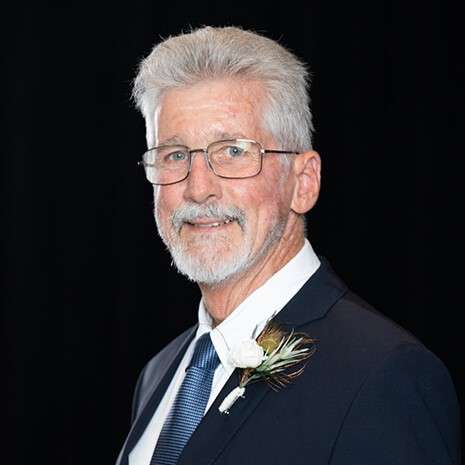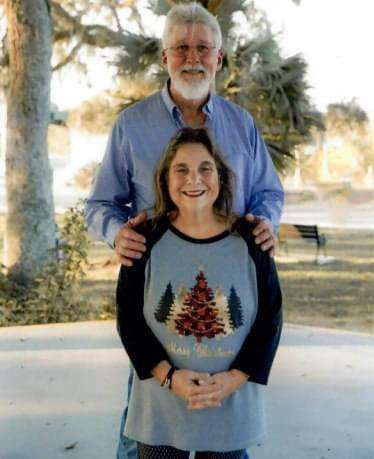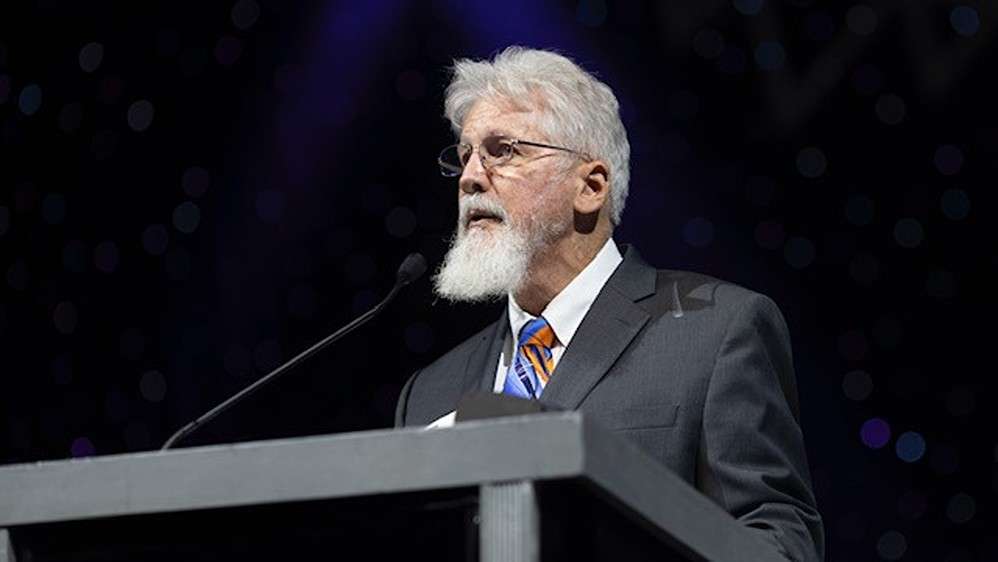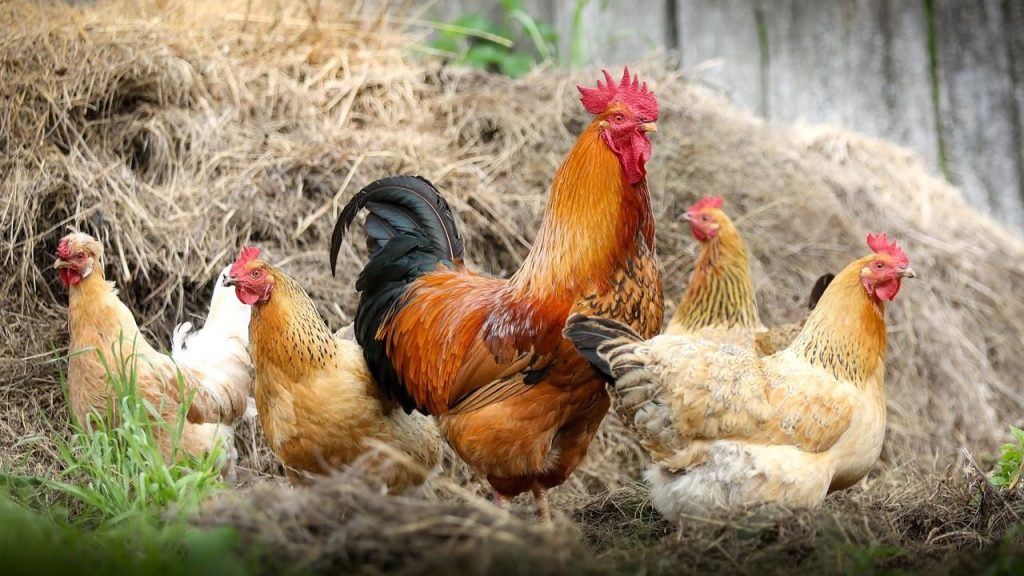
“What a long, strange trip it’s been.” – Gene McAvoy
Gene McAvoy got his start picking tomatoes and strawberries from a small, local New Jersey farm when he was 15 and retired as a top educator and spokesperson for agriculture after his 25 year career as a Regional Specialized Vegetable/Horticulture agent with the UF/IFAS Extension. After retiring in 2019 Gene was awarded the title Extension Agent Emeritus by the University of Florida.
I could not wait to catch up with Gene, especially when remembering the powerful speech he gave when inducted into the Florida Agricultural Hall of Fame – this is one man you just want to be around.

I know your retirement was interrupted about a month in when you were invited to become the Associate Director for Stakeholder Relations at the UF/IFAS SW Florida Research and Education center. How long did you hold that position what responsibilities did you have?
Just before I retired from UF/IFAS as the Hendry Co Extension Director and Regional Specialized Vegetable/Horticulture Agent IV on July 31, 2019, I was contacted by then Senior Vice President Dr. Jack Payne about returning as the Associate Director for Stakeholder Relations at the UF/IFAS SW Florida Research and Education Center in Immokalee. It took 19 days to work out the details – normally when a state employee retires under the drop program they must stay off the state payroll for a least a year but a work around was found and I started back on Aug 19 in Immokalee.
My basic responsibility was outreach with the growers in SW Florida. Due to retirements and other events SWFREC had a number of new faculty hires. Having over 23 years of experience working with growers in SW Florida, Jack felt I would be able to help connect faculty and growers by helping to bring IFAS research to the growers and communicate growers needs to the researchers at SWFREC since I knew the area and area growers well and had gained their trust and respect over the years.
It is difficult to capture the true value of Gene McAvoy to Florida agriculture or to people in general. If I were to attempt to reduce his value to one word it’s ‘service’ – ‘service to others’.
Gene has spent his life – his entire career passing on his knowledge and expertise to help others to live, to grow their own food, to overcome problems, to have a productive life and business, to plan for the future. He has chosen a life of service beginning with the Peace Corp in Niger, Africa right after college and is still serving in an over 50 year career in extension. This choice is most fitting and he has delivered so much value to so many, because extension is service Gene was just fittingly honored with induction into the Florida Agricultural Hall of Fame a few weeks ago.
You are well-known for your South Florida Pest and Disease Hotline. Is that still active and are you still involved?
The hotline is still being published monthly and since fall of 2022 has been taken over by my predecessor Craig Frey, Hendry Co Extension Director and SW Florida multicounty Vegetable Agent, and Anna Mezsaros, Palm Beach County Vegetable Extension Agent.
Some would think you an unlikely candidate to achieve all that you have accomplished during your career. You were born in New Jersey, how did you end up in Florida?
Looking back at the last 60 years, I can honestly say it’s been a long, strange trip.
If I could go back in time and tell my 12 year old self, growing up as an inner city youth in Newark, NJ what he would be doing during his lifetime; that he would leave the city, get a college degree that would prepare him for a career in agriculture, travel around the world, and ultimately work with the giants of Florida agriculture, I think he would have been incredulous, and I still am. As noted above I grew up in the city and had no Ag background nor did my parents or anyone in my family including aunts, uncles etc. When I was around 15, Newark and many cities in the Northeast were gripped by race riots which led my family to move to Hazlet, NJ which was rural and still had several vegetable farms. Since these provided some of the few opportunities for summer jobs in the area, my first job was picking tomatoes and strawberries on one of the local farms.
I did well in high school and earned scholarships to attend Rutgers University. When asked what I wanted to study I said “agriculture I guess” as I had been working on these farms and liked it. My mom had finished high school, but my dad had not and I had very little guidance in that regard. Rutgers is the land grant college in NJ, and I attended the College of Agriculture and Environmental Sciences, now called Cook College. At Rutgers, I worked on the college farm to help pay for my schooling and earned a degree in Plant Science. Since I had received a lot of help through various scholarships at Rutgers, I felt I owed a debt to society and so on graduation in 1974, I decided to join the Peace Corps to pay back my debt.
I was offered a position in Niger, West Africa where I was assigned to a school gardening project. While in Niger, I learned French and Hausa – a local African dialect – and demonstrated the ability to live and work effectively in remote areas in developing countries. I spent two years in Niger and when I was about to leave, I was recruited by the US Agency for International Development (USAID) to return to Niger on a Seed Multiplication Project. This was during the cold war era and the US gov was pouring lots of resources into developing nations around the world to try and prevent the spread of communism. Americans with an Ag background, foreign language skills and the ability to work overseas were in high demand and having those skills I was sought after. These jobs were very well paying compared to what I could get in the US, appealed to my sense of adventure, and allowed me to apply my Ag skills to help people who were deeply in need.
Between Peace Corps and USAID, I returned to NJ for a few months where I met my wife to be Donna who accompanied me back to Africa. I spent a total of five years in Niger and when I returned to the US, I began to pursue MS degree as I felt my lack of a higher degree was limiting my upward mobility with USAID. I had been offered a scholarship to attend New Mexico State to study for a masters in arid land management but on the way there I stopped at Rutgers which was in the process of opening an International Programs Office at the College of Agriculture. With my language skills and international experience I was offered a salaried faculty position as an adjunct instructor in the Department of Horticulture and the opportunity to earn a MS degree while doing so, so I never made it to NM and stayed at Rutgers where I developed and taught a Seed Multiplication class as well as a six week short course in Vegetable Production and Marketing for international mid-level management students.

Gene and Donna
We spent four years in NJ and Donna and I started a family having our two boys Chris and Teddy while we were there. I obtained my MS in 1982 and my major professor who was also involved in international work, turned me onto a job in Jamaica as a project director on a USAID Vegetable Production and Marketing Project. The four of us moved to Jamaica and I started working with six small farmers and eventually built it into a several hundred members production and marketing coop – Saint Catherines Vegetable Growers. Saint Catherines Vegetable Growers produced a wide range of vegetables and shipped primarily Jamaican specialties like callaloo, scotch bonnet pepper, yams, mangos, pumpkins, and herbs to the US, Canada, and Britian. We also supplied hotels, restaurants, groceries, and processors on the island. We spent a total of seven years in Jamaica from 1982-1989. Our time in Jamaica also familiarized us with Florida as we would vacation there and take the boys to places like Disney, and we were also selling product to buyers in Miami and in some way competing with Florida producers.
Then, several things happened in 1989. The government of Jamaica changed and a socialist took power and the Soviet Union had begun to collapse. Since much of what I had done overseas was supported by cold war expenditures, US dollars stopped flowing and my job came to an end. It so happened that I had an Extension Agent from PA Larry Yager, who was working with me on a short-term volunteer position through the Farmer-to-Farmer program. When he learned about my job situation he told me ‘you may not know this but you have been doing Extension work your entire career so when you go back to the US you should look up the local land grant university where ever you land and you will probably find a job.”
Since we had been living in warm countries for so long South Florida looked like a place we would like to settle down. We moved to Florida in Dec 1989 and bought a 35-acre farm in St James City, on Pine Island with the intention of growing tropical fruits like mangos, but unfortunately our dream come true rapidly became our worst nightmare. Apparently the prior owners of the property we bought cut some trees and built an entrance road into the property without permits and were in the process of being cited by Lee Co for the violation when they sold us the property. Shortly after plunking down our life savings on the property, we received notice of violation from the Lee County building and zoning dept. When we went downtown to find out what was going on we were informed that the previous owner had illegally cut down trees and constructed a road on the property. When I asked why they weren’t going after them I was told that we bought the violation.
It also proved easier said than done to find a job in Ag Florida as no one seemed to recognize the worth of my international experience. The situation with Lee County turned into a four-year legal nightmare and Donna and I were forced to take menial jobs to support our family while our funds were tied up in the land on Pine Island. This turned out to be a very difficult time for us as were not making enough to live on and were gradually falling into debt. We finally were able to prove that the realtor who sold us the property had prior knowledge of the violation and did not disclose it to us – we were able to sue to get our money back.
While expecting our third child and in debt I was offered a very lucrative two-year contract with a USAID project in Swaziland, South Africa. So, in 1994 we moved to Swaziland to work on a Village Vegetable Production and Marketing Project. This was just when apartheid ended in South Africa and was a very interesting time. Our third son Andy was born in South Africa, and we were able to make enough money in two years to pay off our debts and return to Florida to try again.
We moved back to Pine Island, and I applied for extension positions in nearly every county in Florida – another long story – before finally getting a job as the horticulture agent in Hendry County in 1997. It was the right job at the right time and I have never looked back.
Gene has been an icon of Florida agriculture for over 25 years. I have found Gene to be invaluable for my program as a source for any information I have needed about agricultural practices and grower issues in southwest Florida.
The list of awards during your years of service including induction into the National Association of County Agricultural Agents Hall of Fame, goes on and on. I think it started with the Farm Credit Young Professional Award in 2002. I know they are all very important to you but, at the risk of putting you on the spot, which one are you most proud of?
They are all very meaningful to me but several come to mind – one was the Farm Credit Young Professional Award which I received at age 50 much to the chagrin of many of my extension colleagues. A few others that stand out include the Rutgers University Dennis Fenton Distinguished Alumni Award as well as the National Association of County Agricultural Agents Hall of Fame and of course the Florida Agriculture Hall of Fame. As well as the Florida Tomato Committee Researcher of the Year Award University of Florida Internationalizing Extension Award and the Syngenta Resistance Fighter Leadership Award among others.
It is so impressive that you were a Peace Corps Volunteer with Village Gardening Project in Niger, West Africa in the 70’s after graduating from Rutgers. Tell us a little bit about that experience.
As noted above I felt I owed a debt to society and so upon graduation, I decided to join the Peace Corps to pay back my debt to society. I was offered a position in Niger, West Africa where I was assigned to a school gardening project. In some ways the School Garden Project was ill conceived as very few students go to school in a country like Niger. Less than 10% go to elementary school, and less that 10% of them go on to high school and less than 10% of them go on to college. Kids go to school to get away from subsistence agriculture so there was very little interest in gardening among the students but their parents were very interested in the demonstration vegetable gardens we created and approached us about learning how to grow vegetables to augment their farm income.
Based on this request we were able to go back to the government and funding agencies and convince them to shift the emphasis to village gardening working with subsistence farmers in a number of villages. I was based in a very remote area about 500 miles from the capital and had to learn French and Hausa a local African dialect to effectively work with the local people. This experience taught me many people skills and instilled me the ability to live independently and work effectively in remote areas in developing countries – skills which I believe later provided a basis for my success in subsequent positions and ultimately in Extension in Florida.
Niger was an amazing experience and I saw things that many people will never experience or only catch a glimpse of on TV. The people were amazing and eager to learn and would give you the shirt off their backs even though they were some of the poorest people on the planet. At the same time it was a tough place to work and I contracted a number of diseases like malaria and undulant fever as well as various parasites, it was painful to observe the poverty and conditions under which the people and many people around the world live.
You have experienced many changes through the years in Florida. Which one do you think has been the most impactful in helping the Florida Farmer?
I have seen many changes, probably the introduction of plastic culture with drip irrigation in vegetable production was extremely impactfully in helping the Florida vegetable farmer, mainly before my time in Extension but it started when I was studying at Rutgers. Adoption of slow release fertilizers, IPM and environmentally friendly pesticides and pest management practices have all been game changers. Changes in marketing have also been important.
What is a passion of yours to see accomplished in assisting to improve Agriculture in Florida?
One of the biggest things I am passionate about is the need to educate non- agriculturalists about the importance of agriculture in Florida, not only in terms of economics and jobs but also the non tangible environment services that ag provides. It is important that we educate not only the public but also our elected officials at the local, state and national level and make sure that people understand that maintaining a viable US Ag sector not only contributes economically as stated above but is also really a matter of national security, especially given my international background and having worked in places where people do not have enough to eat and depend on others for food. I hope I can remain a voice for Ag.
I worked with Gene throughout his career as a multi-county Extension agent for commercial vegetables in southwest Florida. Gene’s outgoing personality kept him in close contact with the growers he served, leading him to understand current issues they faced.
He sought to find solutions by contacting UF researchers and other agencies and working with them. Early in his career Gene set up the newsletter, Southwest Florida Pest and Disease Hotline, which is still serving the region today.
Your feelings on labor issues in agriculture?
The US and Florida can no longer compete on the basis of cheap anything including labor. About 1/3 of the cost of production of the specialty crops (fruits and veggies) and even cane that Florida produces is labor. Americans do not want these jobs our growers rely on H2A labor to provide the labor needed. The H2A program needs to be overhauled to make it more accessible and user friendly. Research and adoption of technology and mechanization to replace labor and make it more efficient is essential to the survival of US and Florida agriculture. We also need to find ways to level the playing field and reduce unfair competition.
Even someone in your position has to have had mentors along the way. Who would you consider to be yours?
So many – Dallas Townsend, Dr. Joan Duskie, Dr. Larry Arrington, Dr. Jim App, Dr. Bill Stall, Dr. Rick Raid, Dr. Jack Payne, Dr. Bernie Pollack, Rutgers University, Industry Leaders like Reggie Brown, Ron Hamel, Hugh English, Joe Marlin Hilliard, and farmers like Cecil Howell, Chuck Obern and many others have all been mentors.
You and your wife Donna live on a ranch outside of LaBelle, Florida, I imagine you being very involved it the running of it. Tell me a little bit about it.
We have a small 40-acre cow calf operation. We chose cattle as they require much less management than crops like vegetables or ornamentals, but still requires some management. I do spend a good bit of time on weekends fixing fences, eradicating invasives, rotating pastures and generally monitoring the health and well being of our animals.
Definitely not a money marker but it does allow us to enjoy a rural lifestyle and look out our windows and see lots of wildlife including the occasional panther and bear, plus the taxes are low enough that we can afford to live on 40 acres. Owning a small farm is a dream come true for Donna and I.
‘Retirement’ is not in your vocabulary! So what’s next?
After I retired in 2022 from SWFREC I started receiving calls from growers and others for assistance so I started a consulting business – Have Gun Will Travel Agricultural Consulting LLC, (another story). I am the president and sole employee. I am doing a range of things including citrus, trop fruits, vegetables and ornamentals – palms. It keeps me as busy as I want to be and pays well. I also volunteer with Farm Bureau – I am on the state vegetable advisory Committee, both Hendry Glades and Collier County Boards of Directors.
I am president of the Hendry County Cattlemen’s Association and spend a good bit of time cooking steaks with them, serve on the Hendry Glades Farm Service Agency County Committee. I also volunteer with Hendry, Collier, and Charlotte County Extension offices and assist with farm tours as well as work on tour with other ag groups including some international farmers and students. Donna and I hope to travel more and would even entertain some international work.
It has been such an honor and pleasure to spend some time going over Gene’s amazing career, all while he still continues to serve and teach. Alongside all the accolades that Gene has under his belt from years of commitment to the agriculture industry, his top priorities are still his faith and family. Hopefully Gene and his lovely wife Donna can slow down just enough to allow for some leisure travel, although something tells me they prefer working vacations. — Faye Westfall



